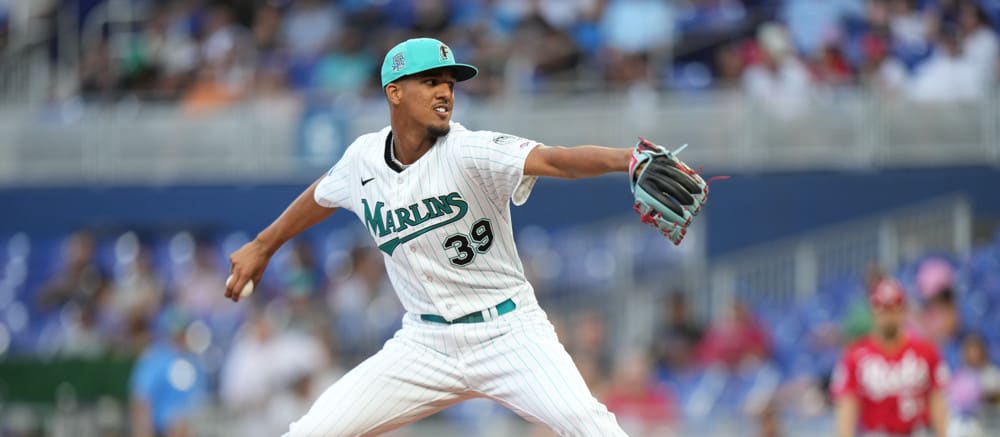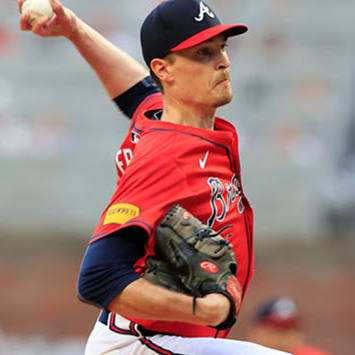This article is part of our Mound Musings series.
Playing favorable matchups has always been a part of successful fantasy baseball strategy, but I feel like the importance of identifying those good matchups is intensifying significantly. Baseball has been trying to create more parity, but the results suggest it isn't working. In fact, results suggest it is just the opposite. The better teams, usually those with more money, are good, while the weakest teams are borderline awful. The more often you can get your pitchers facing those Quad-A teams, the better. Obviously, a favorable matchup doesn't always work out. Beware a bad team can occasionally jump up and bite you – we typically call that "even a blind dog finds a bone sometimes."
Matchups can and will mean making choices. Is a good pitcher against a mediocre team a better option than a mediocre pitcher going against a horrible opponent? There are degrees of "good" and "mediocre," but in the past I probably would have opted for the "good" pitcher. Bad teams typically weren't that bad. Today, I'm not so sure.
Let's start by identifying the best teams for your pitchers to face. These are the "have-nots" of MLB. With the trade deadline having passed, a few "sellers" pushed their way onto the fantasy target list. And, what selling can mean to the team's remaining players should be considered. Sometimes, I might even say often, players on a skeleton roster just go into a funk. It's disinterest, and teams like the White Sox, Royals and Cardinals might be even
Playing favorable matchups has always been a part of successful fantasy baseball strategy, but I feel like the importance of identifying those good matchups is intensifying significantly. Baseball has been trying to create more parity, but the results suggest it isn't working. In fact, results suggest it is just the opposite. The better teams, usually those with more money, are good, while the weakest teams are borderline awful. The more often you can get your pitchers facing those Quad-A teams, the better. Obviously, a favorable matchup doesn't always work out. Beware a bad team can occasionally jump up and bite you – we typically call that "even a blind dog finds a bone sometimes."
Matchups can and will mean making choices. Is a good pitcher against a mediocre team a better option than a mediocre pitcher going against a horrible opponent? There are degrees of "good" and "mediocre," but in the past I probably would have opted for the "good" pitcher. Bad teams typically weren't that bad. Today, I'm not so sure.
Let's start by identifying the best teams for your pitchers to face. These are the "have-nots" of MLB. With the trade deadline having passed, a few "sellers" pushed their way onto the fantasy target list. And, what selling can mean to the team's remaining players should be considered. Sometimes, I might even say often, players on a skeleton roster just go into a funk. It's disinterest, and teams like the White Sox, Royals and Cardinals might be even softer. Note, even though the Rockies aren't that scary, with warmer weather, their home park is still a volatile place and should probably be avoided.
- Oakland Athletics
- Kansas City Royals
- Washington Nationals
- Detroit Tigers
- Chicago White Sox
- Milwaukee Brewers
- Colorado Rockies (away from Coors Field)
Next, we'll look at which I feel are the worst teams for your pitchers to face. They all have a few things in common. They have a lot of talent up and down their lineups, making them dangerous even when a couple of big sticks take a day off. You will find a nucleus of big bats with enough protection to force pitchers to pitch to them, and they are explosive. Your guy might appear to be on cruise control, and all of the sudden, there's an ugly explosion resulting in an ugly inning. In my eyes, Atlanta stands out on this list. I'd rather have my guy pitch in Coors (pretty scary) than have him taken the 2023 version of murderer's row. I'd also like to call attention to Cincinnati and Baltimore. Generally expected to be also-rans, an infusion of exceptional young talent has them exploding.
- Atlanta Braves
- Los Angeles Dodgers
- Houston Astros
- Toronto Blue Jays
- Texas Rangers
- Cincinnati Reds
- Baltimore Orioles
- Colorado Rockies (in Coors Field)
I could have added a couple more. Teams get on hot streaks, and those streaks can sometimes extend for longer than expected. For example, do you know which team has scored the most runs over the last 50 games? It's the Chicago Cubs. That's probably significant enough to make me try to avoid them, too – at least until they come back to Earth. Another team I considered was Tampa Bay, but they seem to have cooled off a bit recently. The lists are definitely fluid.
You might ask what makes a good matchup pitcher:
I thought about it for a bit and decided what type of pitcher profiles well as a matchup pitcher. Obviously, he's not an ace, but rather a middle-of-the rotation type. There are several factors that help his case. First, I want a strike thrower who can routinely get deeper into games, providing a better chance for a win and/or a quality start in leagues with that as a counting category. He might be just an average strikeout pitcher, but he generates a lot of weak contact and hopefully benefits from excellent defense behind him. And, lastly, it's nice if his teammates are capable of providing good run support. Okay, that fits the description of quite a few mid-level arms, but you get the idea.
Formulating a Plan:
Your ability to actively play matchups will depend a lot on a few league parameters. You need roster space to carry a couple extra starting pitchers, and/or liberal free agent access (your matchup pitchers basically become streamers). Obviously, you want to avoid pitchers that simply aren't very good – they can get torched by weak-hitting teams. However, there may be pitchers on the waiver wire or via trade who have artificially inflated peripherals including poor results against those teams you want to avoid, and/or an unlucky BABIP but acceptable results against the weak teams. I used to say don't bench your top-of-the-rotation starters, but I'm actually softening on that. Scary as it may sound, I find myself considering benching my top starter(s) against teams like the Braves or Dodgers in favor of a mediocre arm against the A's or Royals.
Some Notable Rotation Ramblings:
- I understand the perceived need to limit workloads, but I think top-tier kids suffer from moving up and down with irregular innings. Miami's Eury Perez (at the top of my kid's list) didn't look very sharp after returning from a month-long sabbatical at Triple-A. Word is he will now take a regular turn in the Marlin's rotation.
- Toronto's Hyun Jin Ryu was impressing in his second start after returning from Tommy John surgery, but took a comebacker off his knee, finishing his day after four shutout innings. If he can just stay healthy, and get settled in, I like his chances of helping a fantasy team. Hopefully this is nothing significant.
- Continuing with injury/rehab notes, Dodgers' ace Walker Buehler is progressing well and should begin a rehab assignment in the next week or so. I'm a huge fan of his, and if the elbow issues are behind him, he should make a big impact for his fantasy owners next season. A September return seems possible.
- The more specialists are involved the more worried I get, but the Rays' Shane McClanahan is getting multiple opinions which could be hinting at a long-term injury. Players don't usually ask for more opinions when the doc says, "no worries, you'll be fine in a week to 10 days." Crossing my fingers.
- The Padres are scrambling in an attempt to get their starting rotation back together, but it is not proving to be easy. Joe Musgrove is the latest addition to the injured list with a shoulder injury. He's officially been shut down for three weeks, but you know how shoulders go. I fear his season could be over.
- I have voiced concerns over teams, including the White Sox, that may be experiencing clubhouse issues, and now there seems to be confirmation. Is that contributing to a top tier pitcher like Dylan Cease (4.42 ERA, 1.42 WHIP) having a monumentally bad season? I think it does, and its not easy to fix.
Endgame Odyssey:
The White Sox are the latest "wheel of fortune" bullpen where each you spin that wheel to find out who's closing. I still think Gregory Santos will surface, but he's been away from the team. Jimmy Lambert has one, and 35-year-old Bryan Shaw has one in the interim. A change might be coming for the Angels. Carlos Estevez was solid for a fairly long run, but he's been awful of late. I would say time to try Ben Joyce, but he's still on the IL. Maybe Matt Moore? He profiles better as a set-up guy. In Kansas City, Carlos Hernandez got torched recently, and I'm starting to lean toward Austin Cox. He's far from ideal, but there isn't much to choose from here. I really like Detroit's Alex Lange, and his raw stuff is closer-quality, but he has to throw strikes. So, relievers rarely consider slams grand. It's been that kind of week in the bullpen. Besides Estevez and Hernandez, even the extremely reliable Felix Bautista served up a grand slam. He's not in any danger of losing the closer's gig, but it still hurts.









